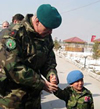Number 55 | October 20, 2008
As the Senate Foreign Relations Committee considers the nomination of James F. Jeffrey to become the next U.S. Ambassador to our NATO ally Turkey and the Committee and the full Senate undertake their respective vetting of the nominee, the Turkish Coalition of America (ATAA) and the Assembly of Turkish American Associations (ATAA) wish to share facts about Turkey, which underscore its pivotal role in advancing United States national interests.
- Turkey continues to make essential contributions to security in neighboring Iraq, aiding the U.S. mission. Militarily, Turkey is the primary logistics hub for Coalition forces and also permits military overflight and the use of the Incirlik air base. Economically, Turkey provides electricity, refined oil products and a variety of medical and consumer products to Iraq. Turkish companies are investing in Iraq’s economic future and are involved in its reconstruction. Politically, Turkey has hosted over 500 Iraqi politicians from all ethnic and sectarian backgrounds for training in democratic institutions.
- Turkey is a NATO leader in Afghanistan. Turkey has twice led NATO’s International Security and Assistance Force (ISAF) in Kabul and has maintained the Provincial Reconstruction Team (PRT) in Wardak.
- Turkey is a regional peacemaker, complementing U.S. foreign policy in its region. Turkey is the central mediator between Syria and Israel in recent negotiations over the Golan Heights. Turkey is an active member of the OSCE Minsk Group seeking to solve the stalemate between Azerbaijan and Armenia. And Turkey is spearheading a new Caucasus Stability Pact to prevent further conflicts as exemplified by the recent battle between Russia and Georgia, during which Turkey permitted the passage of U.S. warships through the straits of Istanbul in accordance to international law and against the warnings of Russia.
- The House and Senate have taken no action on resolutions condemning Turkey for alleged wrongs in its distant history. Because the resolutions are riddled with error and calculated to inflame rather than smooth relations between Turkey and Armenia, these were wise decisions. Indeed, Turkish and Armenian leaders have recently taken bold steps toward reconciliation. In a 2007 survey by Terror Free Tomorrow 75% of Turks expressed eagerness to resolve all issues with Armenia, most supporting the establishment of a neutral joint historic commission.
- Turkey is in step with U.S. policy for the island of Cyprus, which mirrors that of the two Cypriot leaders. Turkey supports the creation of a bi-zonal, bi-communal federated stated on the island, which is the identical roadmap agreed to by both the Greek Cypriot and Turkish Cypriot presidents in ongoing negotiations to unify the island by the end of the year.
- Turkey’s economic relations with the U.S. continue to grow. Turkey now has the 17th largest economy in the world, and likely will be #16 within the next year. Turkey is a key country with respect to energy diversification and security for the West.
Conclusion: The Senate and Mr. Jeffrey ought to focus on the importance and depth of the U.S.-Turkish partnership and the attending issues that will shape this relationship through the remainder of the current administration and into the new one. Meanwhile, the Senate should dismiss the narrow, backward-looking agendas of certain advocacy groups who fear our ally Turkey’s growing regional influence.

























